 Home > CR Interviews
Home > CR Interviews CR Newsmakers Interview: Ben Towle, Craig Fischer
posted June 6, 2013
CR Newsmakers Interview: Ben Towle, Craig Fischer
posted June 6, 2013


*****
I was looking for ways to throw a spotlight on this weekend's HeroesCon in Charlotte -- an extremely well-liked, much-lauded show -- when
Ben Towle contacted me to remind that he and
Craig Fischer were doing an ambitious panel this weekend on comics and music. That's a good subject for a big panel at a comics show, particularly one where Ed Piskor and Peter Bagge are in attendance. I'm also sort of interested in comics programming right now as its own thing -- it has improved across the board in recent year due in no small part to people like Ben and Craig doing ambitious presentations like they will be this weekend.
You can glean what Ben and Craig do from what follows, but it basically breaks down to Ben being a cartoonist (
Oyster War) and Craig being a well-regarded academic. If you're in Charlotte, I hope you'll consider joining them this Saturday at 3 PM. -- Tom Spurgeon
*****
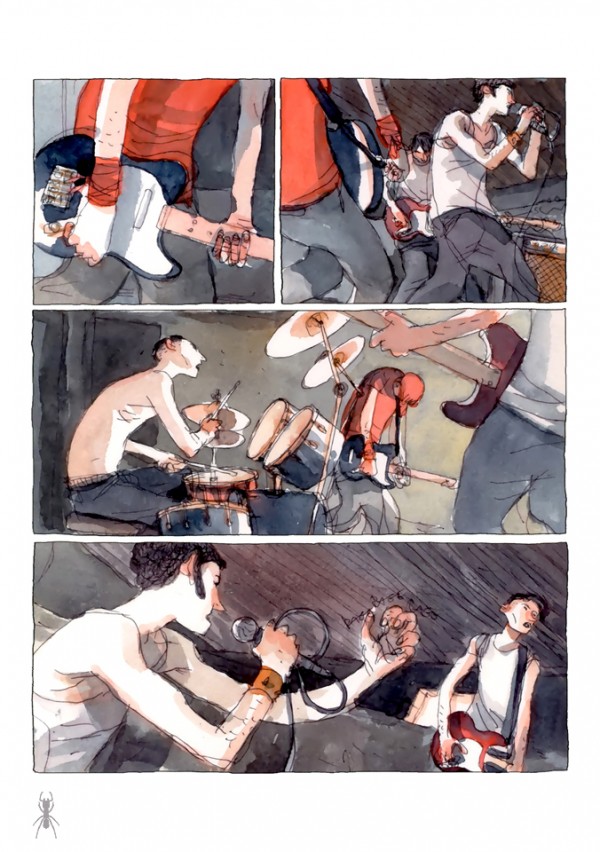 TOM SPURGEON: Ben and Craig, tell me about each of your relationship to Heroes in general; how long you've been going, where it fits into your general festival plans year-in and year-out and how that's developed over the years.
TOM SPURGEON: Ben and Craig, tell me about each of your relationship to Heroes in general; how long you've been going, where it fits into your general festival plans year-in and year-out and how that's developed over the years.
BEN TOWLE: Aside from a few years in Savannah, Georgia, I've been in the general vicinity of Charlotte since I moved to the area to go to college back in the late '80s. I didn't start going to Heroes regularly until I began getting back into comics after a prolonged post-high school absence, though--maybe the mid-'90s or so? I honestly can't remember what year I was first asked to be a guest. Since that time I've been a regular guest each year. This is the first year I've declined a table and will just be doing our Mega-Panel.
The Heroes retail store played an important part in my getting back into comics pretty heavily in the mid-'90s. Like a lot of folks my age, I'd gotten out of comics in the post-"Biff! Boom! Pow! Comics Aren't Just for Kids Any More" era and was focusing on other things, music in particular. I was playing in a band based outside of Charlotte in the mid-'90s. This was of course largely pre-Internet, and so access to and information about non-Marvel/DC comics wasn't a mouse click away, as it is now. One of the guys in the band, though, was really into
Hate and
Eightball and so there were issues of those floating around our house (we all lived together) and in our tour van. I think reading that stuff is largely what rekindled my interest in comics and really got me started drawing again.
The old Heroes shop on Central Avenue didn't carry a huge selection of indie stuff, but it did carry some, which is more than a lot of places at the time. I remember it had one shelf -- the very last one on the bottom -- that was reserved for non "mainstream" stuff and I regularly picked up comics from there that became pretty important to me as a developing artist -- things like
ACME Novelty Library, Zander Cannon's
The Replacement God, etc. Inspired by a lot of this stuff, I started working on a semi-autobiographical strip about life on the road playing music,
The True Life Adventures of the Come On Thunderchild Rock and Roll Band -- the title a somewhat ham-handed homage to the Stanley Booth book about the Rolling Stones. The strip ran as series of one-pagers in a long-forgotten Charlotte weekly paper.
As far as my yearly festival plans go, Heroes -- because of its proximity and low cost to attend (and all around enjoyableness) -- is the one comics show I attend pretty much every year. I'll be making the trek to San Diego this year because of my webcomic's Eisner nomination, but other than Heroes, I'm generally laying low of late con-wise until I have a new book to sell/promote.
CRAIG FISCHER: Ben's much more of a veteran of Heroes than I am. I started going around 2007, when I realized that it was ridiculous of me not to go. Charlotte's only a two-hour drive from my home. One big draw for me was (and is) Indie Island, a space in the middle of Heroes' Artists Alley for alternative cartoonists and publishers like AdHouse, Top Shelf, etc. I think con organizer Shelton Drum came up with the Indie Island idea, and Dustin Harbin ran it for several years, until leaving Heroes to become a full-time artist. Since then, Rico Renzi's kept it going in high style.
I live in a small town with a very mainstream comics shop, so Heroes is a great opportunity for me to browse for books I might otherwise miss. I typically hit Indie Island first, for mini-comics and original art straight from the cartoonists, and then I spread out into Heroes as a whole, looking for bargains on graphic novels and goofy Silver Age comics like
Treasure Chest.
I don't really have any "general festival plans" to speak of. It varies. I've been to SDCC and SPX, but not as often as I'd like, and I also travel to academic conferences (ICAF, the MLA division on Comics and Graphic Narratives) sometimes to present research. I went to the 2010 Festival of Cartoon Art in Columbus, and I really want to return in November 2013 to see the new Billy Ireland Cartoon Library. Heroes, though, is the only convention I'm at every year.
SPURGEON: Where did the idea of doing a Mega-Panel come from? What was the first one like, and how was it different from what we're going to see this year?
FISCHER: Ben and I started our Mega-Panels six years ago, in 2008, when we realized that (a.) Al Feldstein was tabling at the con, and (b.) no one had yet asked him to be part of the programming. Ben and I quickly cobbled together a two-hour EC-themed panel. The first hour was about Harvey Kurtzman: Ben did an overview of Kurtzman's career, I did a close reading of the Kurtzman/Wood story "3-Dimensions!" (
Mad #12), and Fantagraphics helped us prepare a preview of the yet-to-be-published Humbug collection. In the second hour we interviewed Feldstein. (Joining us for the interview were Roger Langridge and Richard Thompson.)
Since then, we've organized our Mega-Panels around various topics. In 2009, our topic was Ditko, in 2010, we took a screwy look at superheroes titled "Defective Comics: A Celebration of Superhero Oddness," and in 2011, our subject was Moebius. Last year, to commemorate Heroes' 30th anniversary, our topic was "Echoes of '82," a survey of events in comics culture from three decades ago that continue to reverberate today. "Echoes of '82" was maybe a little too Mega of a panel. Near the end, while I was interviewing Louise Simonson about the demise of Warren Publishing, her cell phone rang. It was husband Walt on the line, asking where she was, and worried that she'd been gone too long.
TOWLE: Craig's covered the genesis of the whole mega-panel pretty well there. As far as differences between earlier panels and this one goes, I think most of the differences are probably behind the scenes. I think we've gotten better at getting all the pieces in place efficiently after doing this for a few years.

My semi-tongue in cheek answer, though: the main difference is that this is the first year we won't be serving food at the panel! For some reason during the planning of that very first
MAD/E.C. panel, Craig became really determined that we should serve food. We wound up bringing in a sheet cake, as I recall. From that year forward, though, we tried to have food that matched the panel subject thematically. My wife, Katherine, made us a "Mr. A Cake" for the Ditko presentation that looked like Mr. A's half black/half white business card. In the spirit of Ditko, I insisted that the crowd take either a piece from the black-frosted side or from the white-frosted side, but not cut pieces that were part black and part white. You know, because "There is black and there is white. And there is NOTHING ELSE."
She made a blueberry cake for the Moebius talk. I'm spacing on the rest of the themed food items.
SPURGEON: What's the process like for settling in a subject and then planning the actual panels themselves? Can you talk me through this year's in terms of concept to execution?
FISCHER: It's a balancing act among our interests, the creators coming to Heroes, and those folks willing to participate in a long panel. (We're always grateful to those creators willing to give up income they could make on the floor in order to join us for our panels.) Our original idea for 2011 was a panel on science-fiction comics, but some would-be panelists declined, and so we decided to narrow our focus to Moebius. Which work out great: we showed the documentary
Moebius Redux: A Life in Pictures (2007) to an appreciative audience, and Geof Darrow told some hilarious and touching stories about "Jean." The panel comes together, year after year, in no small measure due to the incredible support we get from the Heroes staff, especially Rico, Seth Peagler and Andy Mansell. And this year, Ghost Trees (Brent Bagwell and Seth Nanaa) just stepped up and volunteered to provide our live music -- a really gracious gesture.
As far as this year goes, I'm amazed that we didn't do a panel on music and comics earlier.
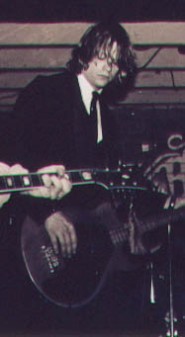 TOWLE:
TOWLE: I've always been pretty passionate about music, so this was definitely an appealing topic, particularly since my music interests sometimes bleed into my own comics work. I've done some one-pagers for a music magazine as well as occasional illustrations/caricatures of musicians as freelance work. I'd been thinking a lot about how to depict sound and music in comics last year when I had a back-and-forth with a friend of Mike Watt's about potentially trying to Kickstart a comic book about The Minutemen.
This Aint' No Picnic: The True Adventures of The Minutemen was the working title, as I recall.
I'm a huge fan of Peter Bagge's work and when I saw he was going to be a guest this year, gears definitely started turning in my head about how to do something featuring him. I'd initially hoped that Derf might make an appearance this year, which would have been a great setup for a non-fiction/reportage topic, given Derf's
My Friend Dahmer and Peter's series of strips for
Reason. I'd been following Ed Piskor's
Hip Hop Family Tree on BoingBoing, though, and his presence along with learning about the Fifth Beatle book really nailed down music as the topic.
Beyond settling on a topic, mostly there's just a lot of emailing of people, dividing up of tasks, etc. that Craig and I do. I put some real effort into the visuals. I'm always surprised by how often I go to panel discussions about comics/cartoonists where no actual comics are shown.
Just as a broad, general statement, I think there's a lot of room to do better, more interesting, more engaging things with the programming at comics events. One thing we really try to do with these mega-panels is to present something beyond the default, "four people and a moderator" thing that's the convention default. Years ago, Craig and I road-tripped down to Athens for an early FLUKE and one thing that had a big impact on our thinking about the first Mega-Panel was how well the ancillary stuff worked at that show. There was the actual "convention" portion of the show, of course, where people sold comics, but there was also a really great associated gallery show/opening focusing on autobiographical comics that evening. There were tons of minis at the gallery for people to read as well as beautiful originals on display from local (and a few non-local, like Johnny Ryan) cartoonists. There was even, now that I think about it, a FLUKE-sponsored live music evening at Tasty World (where FLUKE was then held) that evening.
FISCHER: At that gallery show, I remember issues of Not My Small Diary hung on clotheslines strung across the room. You could just reach up, grab a copy, and retreat to a chair to read. Very cool.
SPURGEON: You're facilitating the performance of a piece of music in conjunction with a Joseph Lambert comic... this is actually part of a trend overall towards comics performances -- whether presenting one's work in public as a reading, or the musical events that Angouleme has been hosting. How do you look on that kind of thing in terms of what it says about the comics? Is this something that really lets us get at the comics, or is this a capitulation towards the marketplace, the fact that cartoonists are always casting about for a way to present their work.
TOWLE: Hmmm… I don't know if I'm going to be able to give you as high-minded an answer here as you're probably looking for. I don't live in a big "comics town," so I've been witness to very few comics readings of the sort you're referencing. Off the cuff, though, I see music accompaniment and read dialog to be somewhat different animals. In the case of the former, there's something to the experience that isn't already on the page. With the latter, the reading is basically "doubling up" -- reading aloud information that's already on the page.
There's something about the intimacy of reading a comic that for me is a big part of what draws me to comics as an art form, though. I really like the fact that comics are not usually public acts that one experiences with other people the way one experiences a film or live music. I don't see really how a live reading of a comic is getting at the comic in some way that you can't get at by reading it yourself. And you're losing an element of the reading experience that I think is important: the reader's self-pacing. (And, in many I've seen, you're losing the page as a unit as well since the cartoonist often reads a panel at a time.)
Joe's comic seems a bit different though. The comic is about playing music and so it's a natural candidate for this treatment in a way that, say, Joe Sacco's comics aren't (to pick a logical extreme). There's music implied by Joe's strip. I'm curious to see what happens when musicians supply that music improvisationally. I don't know that we'll be getting at the comic in some way that we wouldn't otherwise, but it may be a situation in which two things combine to produce an experience that neither would by itself.
I think both with live readings and with musical accompaniment that the possibility for something really interesting happening is most likely to occur if/when cartoonists start designing particular comics specifically for this kind of presentation. That said, I think that there's plenty of room to experiment with what happens when you combine sound/music with comics, as with some of the Marc Weidenbaum projects Craig will be discussing.
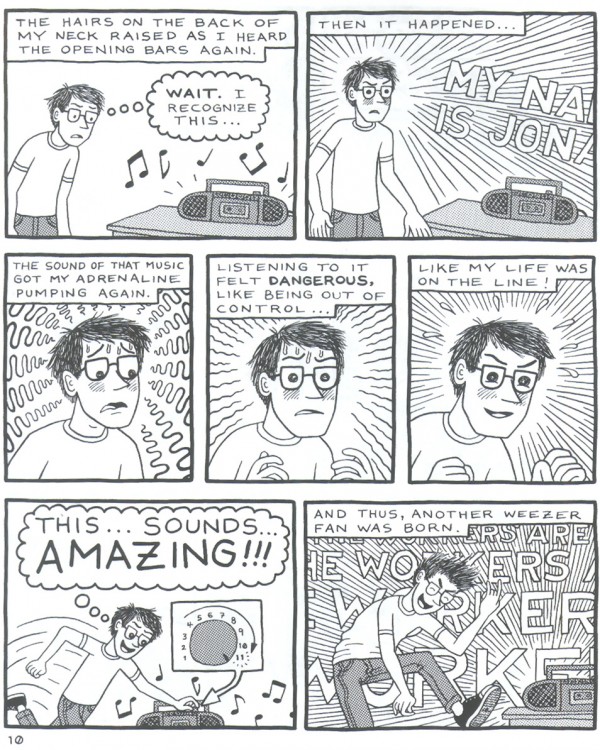 SPURGEON: Tell me a little about choosing Marc Weidenbaum as a subject, and what you feel is important people know about Marc. He was such a big figure for a while because of the high-profile PULSE! gig, but I'm not sure we're not exactly at that point in history where that's forgotten a bit but hasn't been pulled out and re-examined yet.
SPURGEON: Tell me a little about choosing Marc Weidenbaum as a subject, and what you feel is important people know about Marc. He was such a big figure for a while because of the high-profile PULSE! gig, but I'm not sure we're not exactly at that point in history where that's forgotten a bit but hasn't been pulled out and re-examined yet.
FISCHER: Yeah, Marc's legacy as a
PULSE! editor is formidable: he got people like Jessica Abel, Carol Swain, Jon Lewis, Jason Lutes, Peter Kuper, John Porcellino, Keith Knight, Dave Cooper, Tony Millionaire and so many others to do those great back-page "Flipside" comics on musical topics. Justin Green's
Musical Legends book (2004) is terrific, maybe my favorite Green work after
Binky Brown.
Marc also gave a lot of younger alt-cartoonists their first opportunity in a national venue; Marc commissioned
PULSE! work from Adrian Tomine after seeing the earliest self-published issues of
Optic Nerve.
As much as I respect Marc's
PULSE! tenure, though, I'm going to spend as much if not more time in my presentation talking about Marc's Disquiet website, and the ways his activities and commentaries on ambient, electronic and experimental music intersect with comics. One of Marc's "Disquiet Junto" projects, for example, encouraged musicians to "do a sonic version" of the first strip (the template strip) in Matt Madden's
99 Ways to Tell a Story. As part of our panel, we'll stage a "performance" that combines music that came out of the Junto with some of Matt's 99 Ways variations.
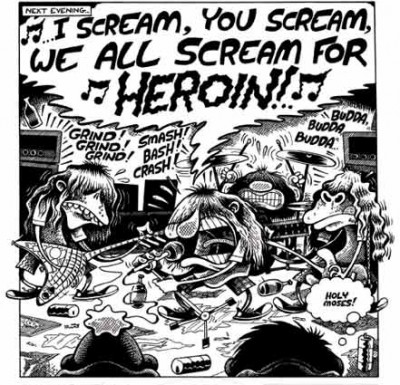 SPURGEON: Do you have a favorite music-related work by Peter Bagge, one of your guests? He's done a bunch of different comics in that general, I guess "space" is the term people use. What can looking at Pete's comics through a musical lens tell us about him?
SPURGEON: Do you have a favorite music-related work by Peter Bagge, one of your guests? He's done a bunch of different comics in that general, I guess "space" is the term people use. What can looking at Pete's comics through a musical lens tell us about him?
TOWLE: Yeah, "space" is an appropriate word here, I think. Unlike Ed and the Fifth Beatle guys, Peter's work is more informed by music than explicitly about music. Maybe it's just because I recently re-read it, but
HATE really got me thinking about Bagge's work though a musical lens, as you say. Buddy Bradley -- Bagge's most overly autobiographical character -- has intriguing views about music. He's genuinely passionate about it, but he also seems to be very determined to set himself in opposition to anything deemed mundane -- even if it's something he actually likes. I'm thinking for example of a panel in
HATE where Buddy's lecturing someone about how The Ramones and The Stones are washed up old hacks and people should stop lining their pockets by going to see them play. There's an arrow pointing to Buddy with text that says something along the lines of "Just sold complete run of Ramones and Stones LPs to pay last month's rent."
"Eh, hipsters…," one might say, but I think there's more going on here than that. Buddy -- and maybe by extension Bagge at the time?--seems to be looking for something genuine, something authentic, something untainted. And that's a theme that's prevalent in some of his contemporaries' work as well. Clowes's Ghost World is the most obvious example.
Interestingly, years later Bagge did a
Reason strip excoriating the modern art scene. He hilariously sends up modern art museums and their patrons, wondering why we don't just appreciate the "unique and imaginative works of art" around us... like the Plymouth PT Cruiser. It's not a direct inverse analog to Buddy's stance on music, but it's a pretty interesting endorsement of modern corporate output from a guy who had
HATE's protagonist literally vomit and run screaming from a date who presented him with a pair of tickets to a U2 concert.
I honestly don't know how to unpack it all, but I'm interested and looking forward to asking Peter Bagge about some of this stuff.
My main motivation for asking Peter Bagge to be on the panel is my hope that it will encourage people to lighten up on bugging him about his libertarian politics and instead start giving him more grief about his unconscionable defense of Mike Love. I'm kidding of course. (Except about Mike Love; that guy's clearly a jerk.)
SPURGEON: Will this material be archived eventually, do you know?
FISCHER: There are audio recordings of several of our earlier Mega-Panels. Here's one for our Feldstein interview, courtesy of Mike Rhode. And Adam Daughhetee of the
Dollar Bin podcast recorded material from our 2010 "Defective Comics" panel featuring Evan Dorkin, Jeff Parker, Colleen Coover and Chris Pitzer (here) and from our 2011 tribute to Moebius (here).
Adam plans to film the entire panel this year -- sound, image, the proverbial whole enchilada.
TOWLE: Nothing to add here other than to just recommend listening to that first audio link of the "Defective Comics" panel in particular. Evan Dorkin's extended rant about the comics industry is one of the most amazing and hilarious things I've ever been witness to. Maybe next year's Mega-Panel should be a focus on Evan Dorkin?
*****
art supplied by Mr. Towle, who is the person in the photo provided
*****
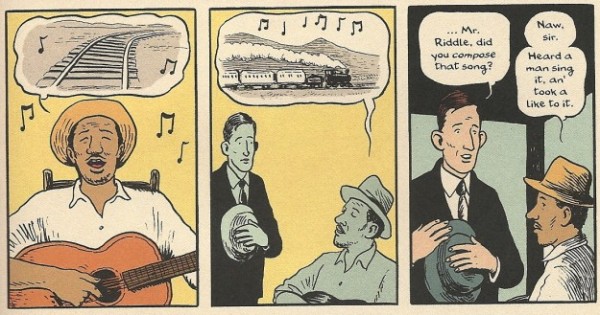
*****
*****


